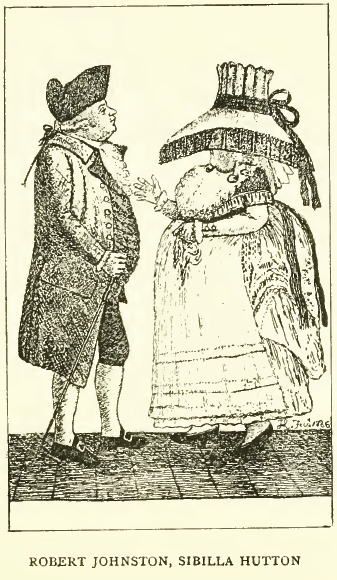Mr. Johnston was the son of the Rev. John Johnston,
minister of Arngask, and brother-gerrnan to Dr. Johnston, of North
Leith. He carried on business for many years as a private banker, in
company with Mr. Donald Smith, under the firm of Johnston & Smith. This
concern, however, proved unfortunate, having met with a series of
losses—among the first of which was a robbery to a considerable amount.
The particulars of this affair are fully given in the following
advertisements from the Courant of 1768 :—
"On Friday evening last [the 12th August] the lock of
the outer door of the compting-house of Johnston & Smith, bankers in the
Exchange, was opened by some wicked persons, as supposed by a
counterfeit key, and eight hundred pounds sterling stolen out of their
drawers, in the following Bank notes, viz.:—
Of the Royal, and Bank of Scotland, - £194 9 0
British Linen Company, - - - - 362 2 0
Dumfries Notes,.....126 0 0
Glasgow Notes,.....64 10 0
General Bank of Perth, - - - - 32 0 0
Dundee Notes (Jobson's), - - -
40 0 0
Several small Notes and Silver, - - 11 1 0
£830 2 0

It is entreated that every honest person will give
the Magistrates of Edinburgh, or Johnston & Smith, notice of any
circumstances that may fall under their observation for discovering the
offenders; and farther, the said Johnston & Smith will give the informer
a reward of Five Pounds sterling for every hundred pounds sterling that
shall be recovered in consequence of such information. As some smith may
very innocently have made a key from an impression of clay or wax, such
smith giving information, as above, so as the person who got the key may
be discovered, shall be handsomely rewarded."
"BY ORDER OF THE HONOURABLE THE MAGISTRATES OF
EDINBURGH.
"Whereas, on Sunday night last, the 14th inst., there
was laid down or dropped at the door of the Council Chamber of this
City, the sum of two hundred and twenty-five pounds sterling, in bank
notes, wrapped in a piece of grey paper, which was found by Robert
Burton, a porter, and immediately after delivered by him to one of the
Magistrates : This is to give notice, that the above sum is now sealed
up, and in the hands of the City Clerks, and will be delivered to any
person who shall prove the property thereof, with deduction of a
reasonable allowance to the porter who found it."
The notes were proved to be the property of Messrs.
Johnston & Smith. In addition to the reward, a proclamation was issued
by the King, promising a free pardon to any one, except the principal,
concerned in the robbery, who should make a disclosure ; and, as a
further inducement, fifty guineas additional were offered by Johnston &
Smith to the informer. These measures were ineffectual; and no traces of
the delinquent could be found, till the apprehension of Deacon Brodie,
twenty years afterwards, induced strong suspicion that he was concerned
in it. It was then recollected that, prior to the robbery, the Deacon
had been employed in making various repairs on the premises of Johnston
& Smith, and had occasion to be frequently in the bank. The key of the
outer door, from which it was ascertained he had taken an impression in
putty, usually hung in the passage, which was rather dark and narrow.
The premises are now occupied by Mr. Adam Luke, treasurer to Heriot's
Hospital.
Not long after this affair, the firm experienced some
severe reverses, arising from a sudden depression in trade, besides
losing a box containing one thousand guineas, which fell into the sea at
Leith, while being handed from a boat to the ship in which it was to be
forwarded to Loudon. Immediately after this accident the firm stopped
payment, and compounded with their creditors at the rate of fifteen
shillings in the pound. Various attempts were made to recover the box.
Among others who dived for the treasure was a tailor in Leith, somewhat
famous for his aquatic dexterity. All his exertions, however, although
repeated with great perseverance for some time, proved unsuccessful.
The copartnery was now broken up; after which Mr.
Smith commenced business on his own account, as a private banker; and,
during the remainder of a long life, was highly successful and
respected, aud filled the office of Lord Provost in the years 1807 and
1808. Mr. Smith married Miss Palmer, daughter of an eminent cabinet
maker in Chapel Street, by whom he obtained considerable property. He
died at his house in West Nicolson Street, in 1814, aged seventy-five.
His son, the late Alexander Smith, Esq., who carried on the banking
business, met with a tragical fate, having been killed in the spring of
1833, by the falling in of a floor of a house in Picardy Place, during
the sale of the collection of pictures belonging to the late John Clerk
of Eldin, Esq., one of the Senators of the College of Justice.
Mr. Johnston also continued, for several years, to discount bills in a
small way, until a Mr. John Alston, hardware and toy merchant (merchant
in Scotland at that time was applied to all traders, whether wholesale
or retail). having failed, he took the bankrupt's goods at a valuation,
and entered into his shop as his successor. In the course of a short
time he added groceries to his other stock; and, finding that branch
turn out the most advantageous, latterly discarded the hardware business
altogether.
Mr. Johnston's manner was peculiar, and he spoke very
fast and indistinctly. He died on the 20th May, 1797, aged sixty-three.

